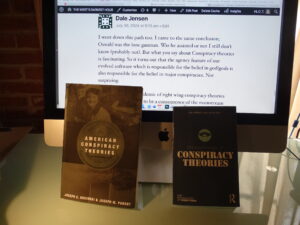In the comments section of my article ‘The Failed Oswald’, on Tuesday I said something that I now quote again, slightly modified. I wrote that I recently acquired two books on the subject of conspiracy theories, one by a couple of Americans and another by a European:
 Both are flawed precisely because their authors are normies. And normies are incapable of seeing the ultimate truth. However, if I dabble in the subject of conspiracy theories it is because, for a dozen years now, I have been dismayed that many on the racial right subscribe to theories which, in my opinion, are like a Vampire sucking the sap from the dissident: who should devote his efforts to developing National Socialism to an evolved, post-1945 NS (cf. what I wrote about Savitri Devi’s magnum opus yesterday).
Both are flawed precisely because their authors are normies. And normies are incapable of seeing the ultimate truth. However, if I dabble in the subject of conspiracy theories it is because, for a dozen years now, I have been dismayed that many on the racial right subscribe to theories which, in my opinion, are like a Vampire sucking the sap from the dissident: who should devote his efforts to developing National Socialism to an evolved, post-1945 NS (cf. what I wrote about Savitri Devi’s magnum opus yesterday).
This said, there is some value in the books pictured above: It is the proles who have no say in the spheres of power who weave these conspiratorial cobwebs. What strikes me is that intelligent people like Chris Martenson are now spinning these kinds of webs regarding the failed Oswald (Thomas Matthew Crooks) while less intelligent people, like those who listened to the Secret Service at the Capitol Hill hearings on Tuesday, are far more sceptical of conspiracy theories.
The powerless are the ones who weave cobwebs in a representative democracy. If demography collapses significantly in an apocalyptic scenario and Aryan man was to return to direct democracy as in ancient Greece, it would be much easier to circumvent these webs where the proles are presently entangled. The subject is complex, and the normie authors of the American book pictured above at least did their statistical work on those who believe in conspiracy theories.
As regular visitors to this site will know, I discovered white nationalism at a late age: after I had been in this world for half a century. My previous intellectual work was focused on the psychic ravages of parental abuse of children.
One of the psychological fallacies mentioned in the books above is that, to the simplistic mindset of the proles, an act of enormous political and social repercussions cannot have a prosaic explanation (Oswald). There has to be a massive conspiracy of very powerful people who had a grudge against JFK. That, of course, is a ‘psychological fallacy’ and those not versed in how the mind of someone who was severely abused as a child or adolescent by their parents works might read The Gunman and His Mother: Lee Harvey Oswald, Marguerite Oswald, and the Making of an Assassin.
It’s hard to imagine how a mother could torment a child so much that, now grown up, he becomes an Oswald. But now that I am revising my autobiographical books for translation into English, I have to pause for a week because the other day I went through my mother’s entire diary, quoted in toto in the second book of my trilogy: a diary so disturbing that I have to take long breaks, even though decades have passed since she wrote it.
Someone like me can understand Oswald, or Thomas Matthew Crooks who suffered massive bullying at school. But anyone who hasn’t been treated so badly by life can’t even imagine it.
Although reading books is a serious way to delve into the matter, not everyone who has rejected the conspiratorial nonsense believed by the proles will do so. If The Gunman and His Mother won’t be on the shelves of those who delve into the JFK assassination, they might at least check out this audiovisual interview with Paul Gregory by Peter Robinson, the host of Uncommon Knowledge. Gregory dealt directly with Oswald and in his recent book debunks the wide range of conspiracy theories about the assassination by demonstrating that Oswald acted alone.
One reply on “Oswald”
As far as conspiracy theories go, this site is the antipodes of The Unz Review.